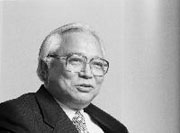The Digital Divide Issue Revisited
Shumpei KUMON (Executive Director, GLOCOM)
 Whether there is a divide between Samuel Huntington's term "Davos Man" and Paul Krugman's "Seattle Man", it is certain that the buttoned-down globalists in pin-stripe suits view the pony-tailed anti-globalists as latter-day phantoms who are too well-equipped with information technology to be disunited by any sovereign power. NGOs and the like insist the opposite holds true: contrary to what pop economists say, nation states never die, they grow like behemoths with ultimate cyber-reconnaissance capacity. If we continue creating enemies this way, perhaps by 2048, a bicentennial year of the 1848 Revolution, we will have flag-waving crowds dominating the world, both real and cyber. Whether there is a divide between Samuel Huntington's term "Davos Man" and Paul Krugman's "Seattle Man", it is certain that the buttoned-down globalists in pin-stripe suits view the pony-tailed anti-globalists as latter-day phantoms who are too well-equipped with information technology to be disunited by any sovereign power. NGOs and the like insist the opposite holds true: contrary to what pop economists say, nation states never die, they grow like behemoths with ultimate cyber-reconnaissance capacity. If we continue creating enemies this way, perhaps by 2048, a bicentennial year of the 1848 Revolution, we will have flag-waving crowds dominating the world, both real and cyber.
This dooms-day scenario is likelier than what we see now, for we still define any divide, the digital divide being no exception, largely in modernistic and confrontational terms. The textbook definition of power divides between those who coerce and those who are coerced. This is because in the modern era we have known only two sources of ultimate power: military force and market force, both of which have tended to polarize and create global hierarchies. Only a limited set of adjectives has been advanced in connection to power: mighty or weak, rich or poor.
The legacy lingers. A vast majority of people maintain that in the Internet world, there will emerge groups of people that are information-rich and those that are not. Economic entities, be it a state or enterprise, will get thrown into mega-competition. Some have fantasized that the new economy will rid itself of a business cycle, similar to saying that Newton's apple will no longer fall. Others, authoritarian state regimes in particular, fear that they will see their power eroded by emerging "netizens" who recognize no national borders. We are thus looking at the Internet still largely from economic, hence confrontational angles, which could I fear be self-fulfilling.
I argue that it would be grossly off the mark if we continue to define the nature of the Internet solely in terms of power as we know it. True, people can become richer and states mightier by optimizing the utility found in the Internet. What is truly unique about the Internet, however, is that it makes possible a platform where people communicate and collaborate rather than compete, where they convince each other rather than coerce. While peace and prosperity are achievable via the Internet, most people come onto the platform seeking pleasure and congeniality. Whatever the gap that will exist in the Internet community, it will not be vertical but horizontal. Equalization, not polarization, is the Internet's buzz word. There can only be participants who are better or worse not in any absolute terms but relative to others.
Indeed the Internet as a medium resembles neither telephone communication nor broadcasting, two of the new media that revolutionized the way we lived in the previous century. For it is not a personal medium as with telephone communication or a mass medium that TV broadcasting represents. It is a group medium that advances both inter and intra group communication. Sometimes it even helps create groups per se. Such being the nature of the Internet, unless we come to grips with it debating the digital divide will do more harm than we expect.
|





